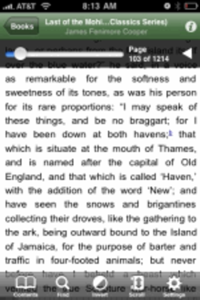Barnes & Noble, the beleaguered online bookstore, opened its eBook store yesterday. That, by itself would be a major news story, but B&N also announced that it has partnered with Plastic Logic, which is expected to release a highly anticipated Kindle competitor soon. For now, eBooks bought through B&N can be read on PCs and Macs, as well as on iPhones and Blackberries. While iPhone and Blackberry apps are nice, though, no eBook vendor can really compete with Amazon without a good hardware eReader that is integrated closely with an eBook store. Given that B&N seems to have all of the necessary pieces in place, however, we think that the the company can indeed challenge Amazon, especially given that it offers a larger selection of books and plans to offer a device that is more open than Amazon’s Kindle.

Nice Mobile and Desktop Apps – But the Plastic Logic eReader is What It’s All About
We tested the iPhone app yesterday, and it is indeed a very capable eReader app. It especially stands out because it gives users the ability to customize everything from background and text colors, to what gesture users prefer to switch pages (swipe or tap), as well as line spacing, font size, and margins. The desktop app, which we tested on a Windows PC, is also very usable and customizable, but doesn’t feel quite as elegant as the iPhone app.
While the apps are good, though, the B&N eBook store will only be able to really live up to its potential once the company starts to sell the Plastic Logic eReader. While the Kindle is a great device, there can be no doubt that the design is a bit clunky. The Plastic Logic reader, however, looks quite slick, and thanks to its touchscreen, it also offers a sought-after capability that the Kindle currently doesn’t offer. In order to compete with Amazon, though, B&N will have to sell the Plastic Logic reader at a price that compares well with Amazon’s Kindles.

Wireless Store?
One feature that makes the Kindle stand out from its current competition is the ability to buy and download books wirelessly directly from the device. According to Plastic Logic, the company’s eReader will also be able to transfer information wirelessly, though it is not quite clear if this will mean that B&N will partner with a wireless provider, yet. If B&N and Plastic Logic decide against this, though, this could give users an important reason to shun B&N’s eReader/eBook store combo.
Can Barnes & Noble Compete with Amazon?
In the perfect world, it wouldn’t make a difference whether you prefer a Plastic Logic reader, a Sony Reader, a Kindle, or an iRex iLiad. The Kindle has shown (and so did the iPod before it) that having full control over the hardware and content typically results in a more convenient and attractive package for consumers. In the long run, this will probably (hopefully?) change, but for now, we think B&N is doing the right thing by copying this model for its eBook store, though we will have to wait until the roll-out of the Plastic Logic eReader and how consumers react to it before we can really render a final verdict.
As B&N decided not to compete on price (it sells most eBooks for the same $9.99 as Amazon and also offers free samples for every book, as well as a selection of books for under $5), the quality of the hardware, the number of available books, the openness of the store, and the quality of B&N’s service in general will be the areas where the company will have to stand out. Given what we have seen so far, we think that Barnes & Noble might indeed be able to challenge Amazon’s position in this market, especially given that we are still in the early days of the eBook and only a few consumers have picked sides at this point, and even fewer have actually bought an eReader yet.

















